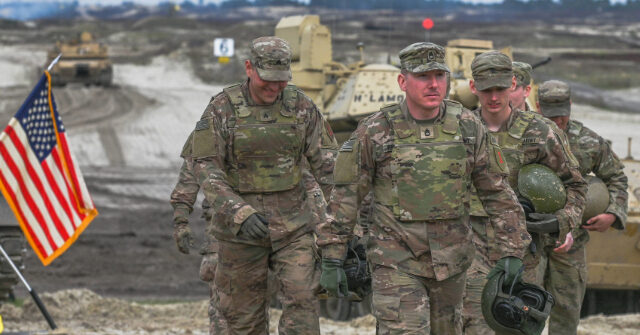A report has found that the United States military is “not prepared” to fight in a major war, as “major powers” — such as Russia and China — have become “top threats” to the U.S., with China “outpacing” the U.S.
The report, which the Commission on the National Defense Strategy released in July, reveals that while the U.S. is currently facing some of “the most serious and most challenging” threats since 1945, several problems are preventing the U.S. military from being able to address threats from China or Russia.
Among the problems preventing the U.S. military from addressing threats from China and Russia is reportedly the Department of Defense’s (DOD) “business practices, byzantine research,” and its “reliance on decades-old military hardware,” which reflects “an era of uncontested military dominance.” The report adds that “such methods” are “not suited to today’s strategic environment.”
The report also notes that the U.S. military has faced “recent recruitment shortfalls” that have led to a decrease in “the size of the Army, Air Force, and Navy.”
In its new report, the Commission on the National Defense Strategy warns of mounting security threats, stresses innovation, and recommends strengthening the DoD as part of an “all elements of national power” approach to security. https://t.co/5daqljphsp
— RAND (@RANDCorporation) July 29, 2024
“The threats the United States faces are the most serious and most challenging the nation has encountered since 1945 and include the potential for near-term major war,” the report states. “The United States last fought a global conflict during World War II, which ended nearly 80 years ago. The nation was last prepared for such a fight during the Cold War, which ended 35 years ago. It is not prepared today.”
China and Russia are described as major powers that are trying “to undermine” the influence of the U.S., with China “outpacing the United States”:
The Commission finds that, in many ways, China is outpacing the United States and has largely negated the U.S. military advantage in the Western Pacific through two decades of focused military investment. Without significant change by the United States, the balance of power will continue to shift in China’s favor. China’s overall annual spending on defense is estimated at as much as $711 billion, and the Chinese government in March 2024 announced an increase in annual defense spending of 7.2 percent.
The report adds that China and Russia established a “no-limits” partnership in February 2022 that has “only deepened and broadened to include a military and economic partnership with Iran and North Korea.”
“This new alignment of nations opposed to U.S. interests creates a real risk, if not likelihood, that conflict anywhere could become a multitheater or global war,” the report explains, adding that the U.S. “needs a similarly integrated approach to match, deter, and overcome theirs.”
The report notes that “the U.S. defense industrial base (DIB) is unable to meet the equipment, technology, and munitions needs of the United States and its allies and partners.”
Due to the U.S. industrial base not being able to produce “everything needed,” the Commission adds that the U.S. “should coordinate and partner with its allies” to “increase industrial capacity.”
The report adds that Congress, the DOD, “and other agencies” need to work together to “rewrite laws and regulations” to “remove unnecessary barriers to adopting innovation, budgeting, and procurement.”
“New authorities may be needed to promote jointness, strengthen the DoD workforce, and supplement the national security authorities of other agencies,” the report says. “Integration with allies requires dismantling barriers to information-sharing, coproduction, and exports.”
Over the recent years, China’s growing economic, diplomatic, and military powers have served as a “significant long-term challenge” to the U.S., leaving many concerned that China will overtake the U.S. as a superpower.
Most recently, it was reported that Russian and Chinese bombers had been flying together off the coast of Alaska. While the bombers were reportedly not seen as a threat, it represents the first time that Chinese bomber aircraft have flown close to Alaska’s Air Defense Identification Zone and the first time aircraft from both countries have taken off from the same base in Russia.






